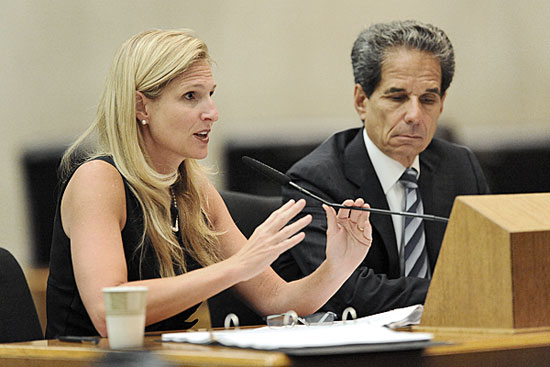Jail probe blasts sheriff’s brass
September 7, 2012

Tamerlin Godley presented findings of the personnel and training portion of the investigation. Bert Deixler, right, discussed the discipline probe.
In a day that will surely be remembered as one of the most difficult in the history of the Los Angeles County Sheriff’s Department, the investigative staff of the Citizens’ Commission on Jail Violence on Friday issued a broad condemnation of the agency’s top management, including Sheriff Lee Baca, for fostering and even encouraging unnecessary violence by custody deputies, while tolerating cliques in their ranks and a code of silence.
Among other things, Baca was criticized for failing “to monitor and proactively control use of force,” turning the responsibility over to top aides “without effective oversight.” One of those aides was Undersheriff Paul Tanaka, the department’s second-in-command, who, according to commission investigators, “discouraged supervisors from investigating deputy misconduct” and undermined the credibility of internal investigators.
Despite concerns expressed by a commander and others about the use of excessive force in the Men’s Central Jail, “key department leaders ignored and failed to address deputy aggression at MCJ,” according to one of six Power Point presentations discussed during a dramatic session of the seven-member Jail Commission, which was created by the Board of Supervisors last October.
Baca, who had earlier said he was unaware of force problems in the jail, strongly backed the panel’s creation and instituted a series of reforms within the department that, by all accounts, have substantially reduced use of force incidents in the dangerous jail system. He also has defended Tanaka, calling him “uniquely qualified.”
The commission’s investigative work was done for free by nearly 50 lawyers from across Los Angeles, some of whom played key roles in earlier law enforcement probes, including the Christopher Commission. They were led by General Counsel Richard Drooyan of Munger, Tolles & Olson. Drooyan, like many of the attorneys he recruited, formerly worked in the U.S. Attorney’s Office.
The findings will be incorporated into a final report with recommendations for reform by the high-profile commissioners, led by Chair Lourdes Baird, a retired federal judge, and Vice Chair Cecil “Chip” Murrary, former pastor of First AME Church. Release of the report is expected late this month.
The findings were divided into six areas of inquiry, included here with links to each of the detailed Power Points. Those areas were: management, use of force, culture, personnel, discipline and oversight.
Some of the findings had been foreshadowed in months of public testimony before the commission from current and retired Sheriff Department employees who said their efforts to crack down on excessive force had been undercut by Tanaka and former Men’s Central Jail Captain Daniel Cruz—both of whom have denied being lax in their responsibilities.
But what was surprising about Friday’s session was the breadth of the alleged failures and the no-holds-barred language used to describe them.
The investigators, for example, said the sheriff “failed to hold senior management accountable,” even though he’s acknowledged publicly that they kept him in the dark about the jail violence problems. Moreover, investigators said Baca has failed to discipline Tanaka, although the sheriff himself has said that his No. 2 had made comments that were “inappropriate and sent the wrong message to department personnel.” There is “no record that senior management has been disciplined, demoted, or faced any consequences,” according to the investigators.
Investigators argued that these lapses at the top helped create a culture in which excessive force against inmates could grow—force that was “disproportionate to the threat posed [to deputies] or when there was no threat at all.”
Some deputies, according to investigators, pitted inmates against each other in violent confrontations and “used humiliation as a tool to harass inmates” through strip searches.
What’s more, according to investigators, the internal review process only encouraged more of the same. They found that, between 2006 and 2011, less than 1% of force incidents were determined by the department to be “unreasonable,” which “casts doubt on the integrity of its force assessments and the reliability of its data.” Only two deputies in the past five years were found to have provided false statements in regard to force reports, a number that raises questions about the adequacy of internal investigations.
Also contributing to the problems, investigators said, were sweeping shortcomings in the areas of personnel and training, including a failure until last year to rotate assignments in the jail. This failure, investigators argued, “contributed to the growth of cliques, a culture of silence and problems of insubordination.” In earlier testimony before the commission, it was disclosed that Tanaka had scuttled one jail captain’s plan to rotate jail assignments, even though it had been approved through the chain of command.
The investigators were also harshly critical of the quality of training and supervision in the jail, saying some of the newest custody deputies have been assigned to the most difficult floors or modules and that the department “fails to adequately monitor” their performance.












 405 bridge work causes a stink
405 bridge work causes a stink
